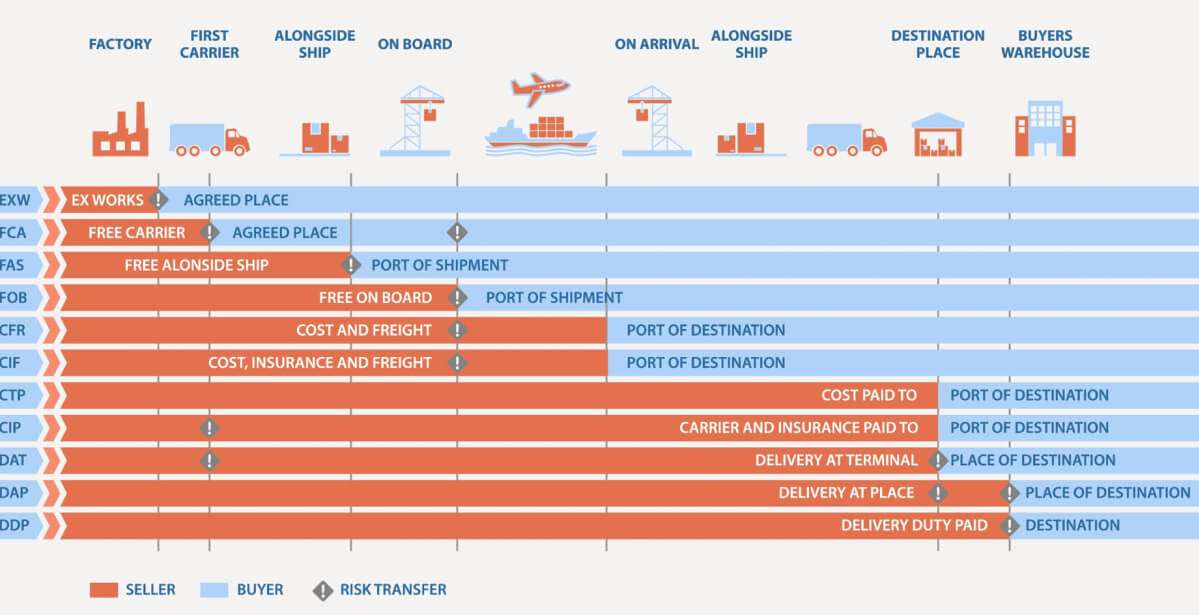
What are Incoterms®? All you need to know
Incoterms - an abbreviation of international commercial terms - are rules that facilitate fair and consistent global trade. They outline the shipping responsibilities of Buyers (Importers) and Suppliers (Exporters). The International Chamber of Commerce (ICC) introduced the rules in 1923. Since then, there have been several revisions to Incoterms, the most recent edition being 'Incoterms 2020'. Incoterms are recognised by numerous countries that engage in international trade.
What are the types of Incoterms?
At the time of this publication, there are currently 11 Incoterms designed to outline the risks and costs assumed by Buyers and Suppliers in each trade agreement. These are broken into two subcategories:
Rules for any mode of transport (x7) Rules for sea and inland waterway transport (x4) The 7 rules for any mode of Transport
Group E
EXW - Ex Works (insert place of delivery) - the Supplier arranges the trade of products, but it's the Buyer's responsibility to arrange shipment to the preferred location (which could be the Buyer's premises or a third party address).
Group F
FCA - Free Carrier (insert named place of delivery) - the Supplier arranges shipment of goods and assumes responsibility for risks and costs. Once the goods are in with the carrier, the Buyer is then responsible for the risks and costs of the shipment.
Group C
CPT - Carriage Paid to (insert place of destination) - the Supplier must pay additional freight costs for the goods (even after the Buyer has assumed responsibility for risk) when the carrier receives the item.
CIP - Carriage and Insurance Paid To (insert place of destination) - the Supplier incurs additional freight and insurance costs for the goods even after the carrier receives the item. The Buyer assumes responsibility for loss or damage to goods during transportation.
Group D
DAP - Delivered at Place (insert named place of destination) - the Supplier is responsible for all risks and costs of goods being shipped until they reach their destination (regardless of the location). This includes freight and insurance costs but not customs duties, import permits or the costs of unloading goods, which are the Buyer's responsibilities.
DPU - Delivered at Place Unloaded (insert place of destination) - the Supplier is responsible for the shipped goods - including all risks and costs - until they reach their destination (wherever it may be). This includes all freight and insurance costs and the costs of unloading goods but not customs duties or import permits.
DDP - Delivered Duty Paid (insert place of destination) - the Supplier assumes all responsibility for risks and costs of shipped goods - including customs and import duties and insurance costs - until they reach their destination.
The 4 rules for sea and inland waterway transport
At the time of this publication, there are currently 11 Incoterms designed to outline the risks and costs assumed by Buyers and Suppliers in each trade agreement. These are broken into two subcategories:
Group F
FAS - Free Alongside Ship (insert name of the loading port) - the Supplier arranges for the shipment to reach the Buyer's vessel. At this point, the Buyer assumes responsibility for all risks and costs, including loading, transport, insurance and import costs.
FOB - Free on Board (insert named port of loading) - the Supplier arranges shipment via vessel to a named Buyer and assumes responsibility for risks and costs.
Group C
CFR - Cost and Freight (insert named port of destination) - the Supplier pays additional costs to insure the goods until they reach the Buyer or final recipient.
CIF - Cost Insurance and Freight (insert named port of destination) - the Supplier pays additional freight and insurance costs for commodities even after the Buyer has assumed responsibility at the point that the carrier receives the item.